Reflective Essay: Critical Thinking and Managerial Decision-Making
VerifiedAdded on 2022/11/16
|12
|2942
|358
Essay
AI Summary
This essay provides a reflective analysis of critical thinking and its application in managerial decision-making, drawing upon various models and frameworks. The student explores their decision-making skills, argumentative abilities, and leadership qualities, using real-life examples from their experience as a production manager. The essay discusses the importance of self-awareness, argumentation, and the use of models like the Paul Elder Critical Thinking Framework and the DISC model. It highlights the significance of inductive, deductive, and abductive thinking, along with concepts like triangulation, in improving decision-making processes. The student demonstrates an understanding of how these concepts contribute to effective leadership, particularly in managing change and convincing employees. The analysis includes self-assessment, application of theoretical concepts, and the student's personal growth in critical thinking, providing a comprehensive view of how these skills are applied in practice. The student also reflects on how critical thinking can be applied in leadership, management and production.
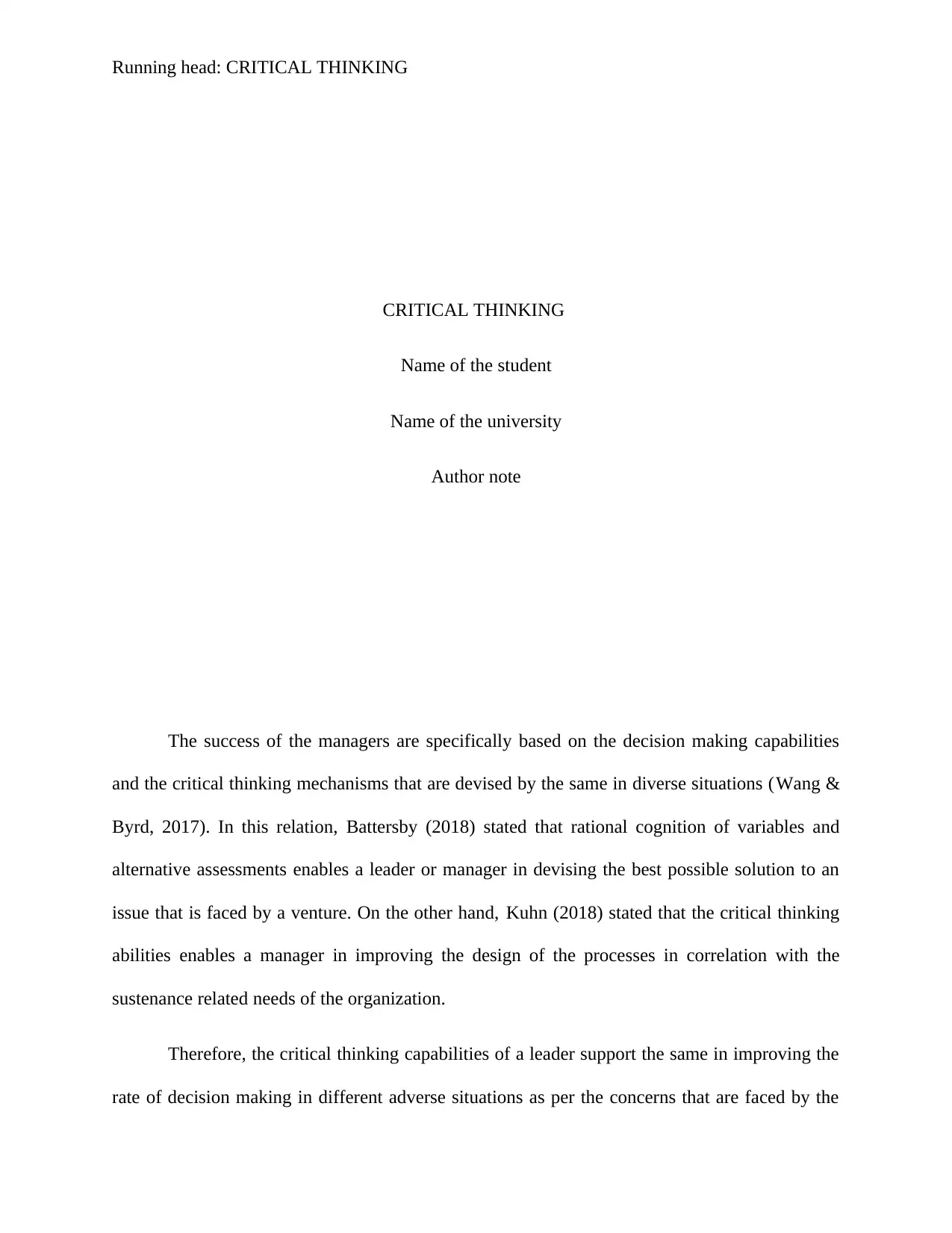
Running head: CRITICAL THINKING
CRITICAL THINKING
Name of the student
Name of the university
Author note
The success of the managers are specifically based on the decision making capabilities
and the critical thinking mechanisms that are devised by the same in diverse situations (Wang &
Byrd, 2017). In this relation, Battersby (2018) stated that rational cognition of variables and
alternative assessments enables a leader or manager in devising the best possible solution to an
issue that is faced by a venture. On the other hand, Kuhn (2018) stated that the critical thinking
abilities enables a manager in improving the design of the processes in correlation with the
sustenance related needs of the organization.
Therefore, the critical thinking capabilities of a leader support the same in improving the
rate of decision making in different adverse situations as per the concerns that are faced by the
CRITICAL THINKING
Name of the student
Name of the university
Author note
The success of the managers are specifically based on the decision making capabilities
and the critical thinking mechanisms that are devised by the same in diverse situations (Wang &
Byrd, 2017). In this relation, Battersby (2018) stated that rational cognition of variables and
alternative assessments enables a leader or manager in devising the best possible solution to an
issue that is faced by a venture. On the other hand, Kuhn (2018) stated that the critical thinking
abilities enables a manager in improving the design of the processes in correlation with the
sustenance related needs of the organization.
Therefore, the critical thinking capabilities of a leader support the same in improving the
rate of decision making in different adverse situations as per the concerns that are faced by the
Paraphrase This Document
Need a fresh take? Get an instant paraphrase of this document with our AI Paraphraser
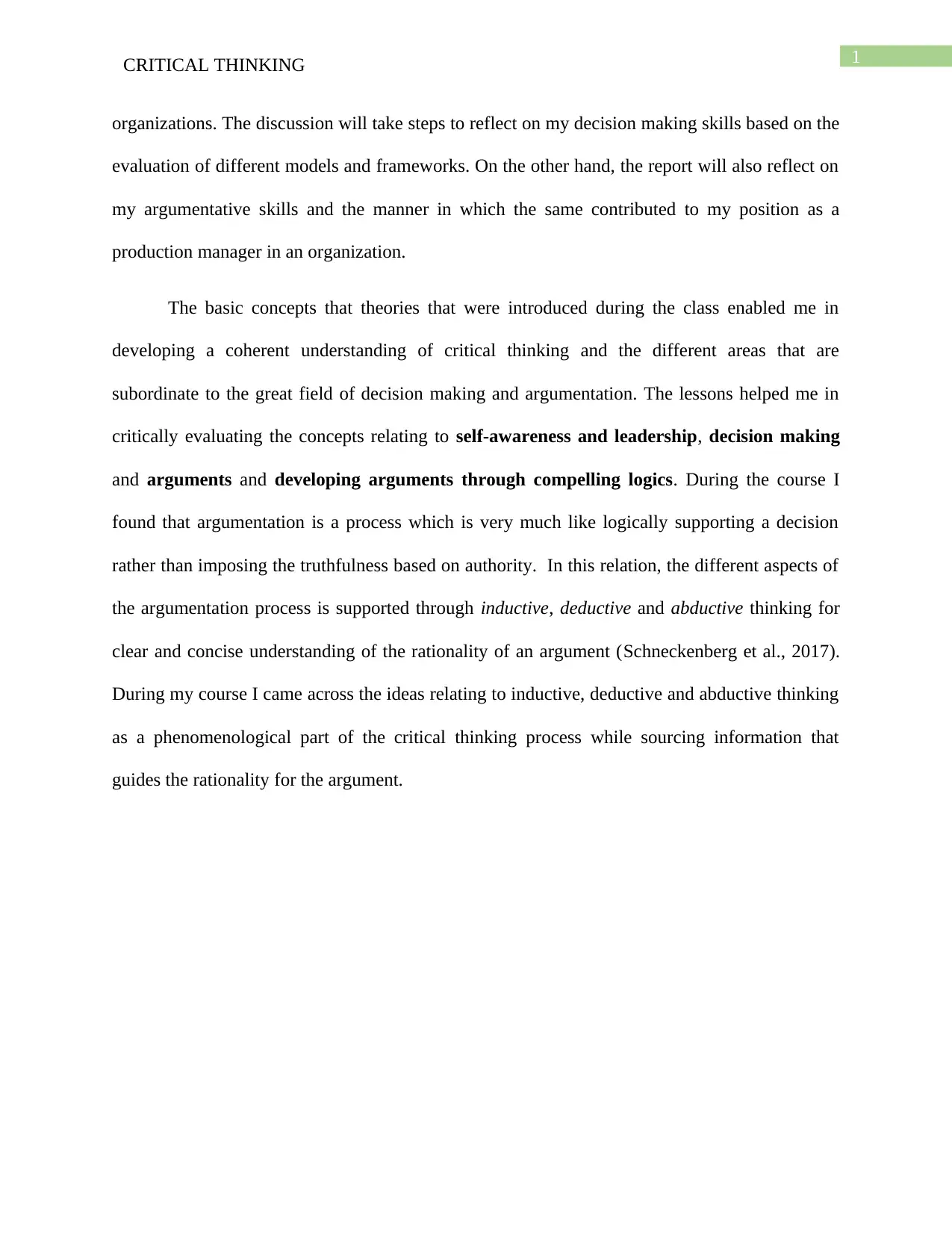
1CRITICAL THINKING
organizations. The discussion will take steps to reflect on my decision making skills based on the
evaluation of different models and frameworks. On the other hand, the report will also reflect on
my argumentative skills and the manner in which the same contributed to my position as a
production manager in an organization.
The basic concepts that theories that were introduced during the class enabled me in
developing a coherent understanding of critical thinking and the different areas that are
subordinate to the great field of decision making and argumentation. The lessons helped me in
critically evaluating the concepts relating to self-awareness and leadership, decision making
and arguments and developing arguments through compelling logics. During the course I
found that argumentation is a process which is very much like logically supporting a decision
rather than imposing the truthfulness based on authority. In this relation, the different aspects of
the argumentation process is supported through inductive, deductive and abductive thinking for
clear and concise understanding of the rationality of an argument (Schneckenberg et al., 2017).
During my course I came across the ideas relating to inductive, deductive and abductive thinking
as a phenomenological part of the critical thinking process while sourcing information that
guides the rationality for the argument.
organizations. The discussion will take steps to reflect on my decision making skills based on the
evaluation of different models and frameworks. On the other hand, the report will also reflect on
my argumentative skills and the manner in which the same contributed to my position as a
production manager in an organization.
The basic concepts that theories that were introduced during the class enabled me in
developing a coherent understanding of critical thinking and the different areas that are
subordinate to the great field of decision making and argumentation. The lessons helped me in
critically evaluating the concepts relating to self-awareness and leadership, decision making
and arguments and developing arguments through compelling logics. During the course I
found that argumentation is a process which is very much like logically supporting a decision
rather than imposing the truthfulness based on authority. In this relation, the different aspects of
the argumentation process is supported through inductive, deductive and abductive thinking for
clear and concise understanding of the rationality of an argument (Schneckenberg et al., 2017).
During my course I came across the ideas relating to inductive, deductive and abductive thinking
as a phenomenological part of the critical thinking process while sourcing information that
guides the rationality for the argument.
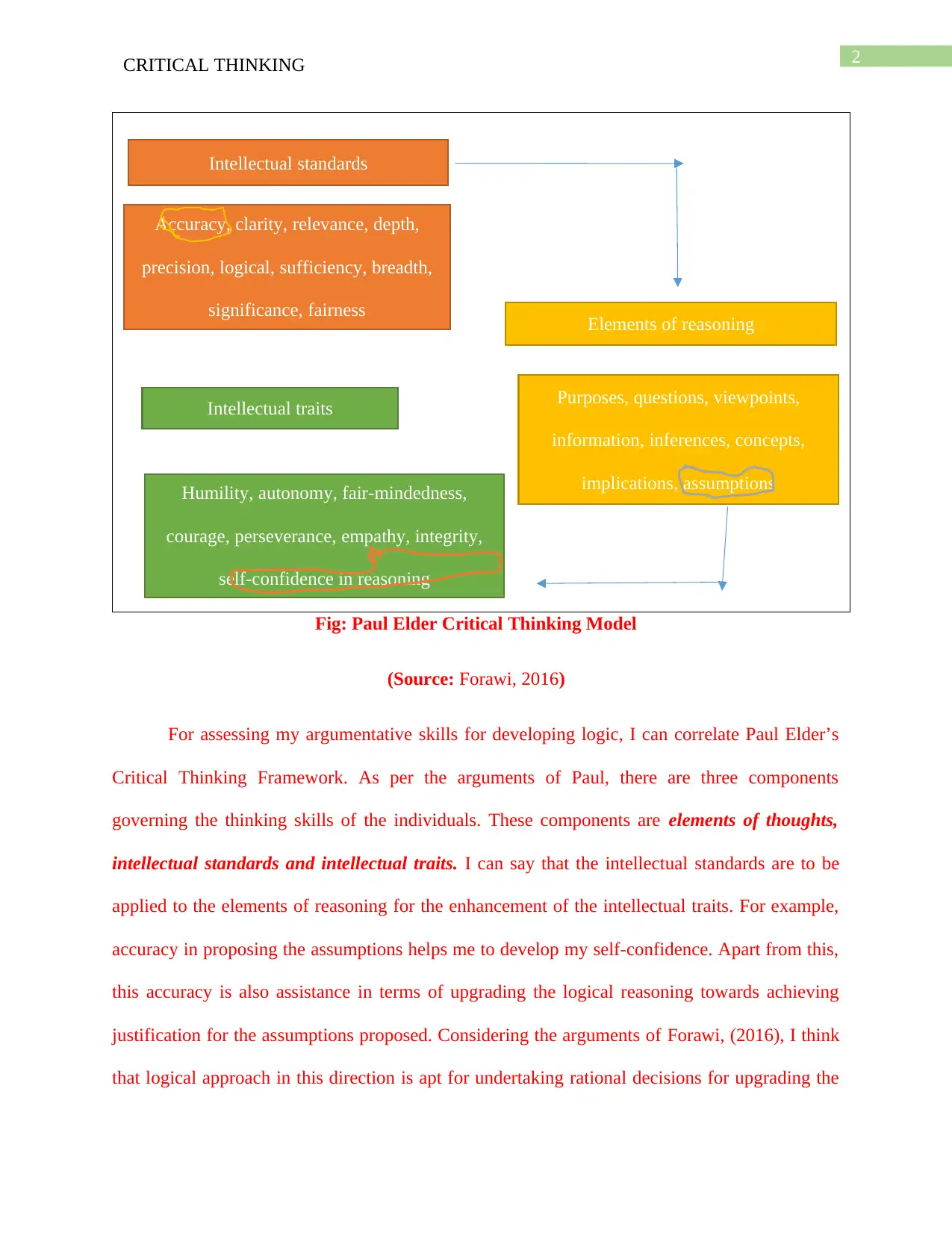
2CRITICAL THINKING
Fig: Paul Elder Critical Thinking Model
(Source: Forawi, 2016)
For assessing my argumentative skills for developing logic, I can correlate Paul Elder’s
Critical Thinking Framework. As per the arguments of Paul, there are three components
governing the thinking skills of the individuals. These components are elements of thoughts,
intellectual standards and intellectual traits. I can say that the intellectual standards are to be
applied to the elements of reasoning for the enhancement of the intellectual traits. For example,
accuracy in proposing the assumptions helps me to develop my self-confidence. Apart from this,
this accuracy is also assistance in terms of upgrading the logical reasoning towards achieving
justification for the assumptions proposed. Considering the arguments of Forawi, (2016), I think
that logical approach in this direction is apt for undertaking rational decisions for upgrading the
Intellectual standards
Accuracy, clarity, relevance, depth,
precision, logical, sufficiency, breadth,
significance, fairness Elements of reasoning
Purposes, questions, viewpoints,
information, inferences, concepts,
implications, assumptions
Intellectual traits
Humility, autonomy, fair-mindedness,
courage, perseverance, empathy, integrity,
self-confidence in reasoning
Fig: Paul Elder Critical Thinking Model
(Source: Forawi, 2016)
For assessing my argumentative skills for developing logic, I can correlate Paul Elder’s
Critical Thinking Framework. As per the arguments of Paul, there are three components
governing the thinking skills of the individuals. These components are elements of thoughts,
intellectual standards and intellectual traits. I can say that the intellectual standards are to be
applied to the elements of reasoning for the enhancement of the intellectual traits. For example,
accuracy in proposing the assumptions helps me to develop my self-confidence. Apart from this,
this accuracy is also assistance in terms of upgrading the logical reasoning towards achieving
justification for the assumptions proposed. Considering the arguments of Forawi, (2016), I think
that logical approach in this direction is apt for undertaking rational decisions for upgrading the
Intellectual standards
Accuracy, clarity, relevance, depth,
precision, logical, sufficiency, breadth,
significance, fairness Elements of reasoning
Purposes, questions, viewpoints,
information, inferences, concepts,
implications, assumptions
Intellectual traits
Humility, autonomy, fair-mindedness,
courage, perseverance, empathy, integrity,
self-confidence in reasoning
⊘ This is a preview!⊘
Do you want full access?
Subscribe today to unlock all pages.

Trusted by 1+ million students worldwide
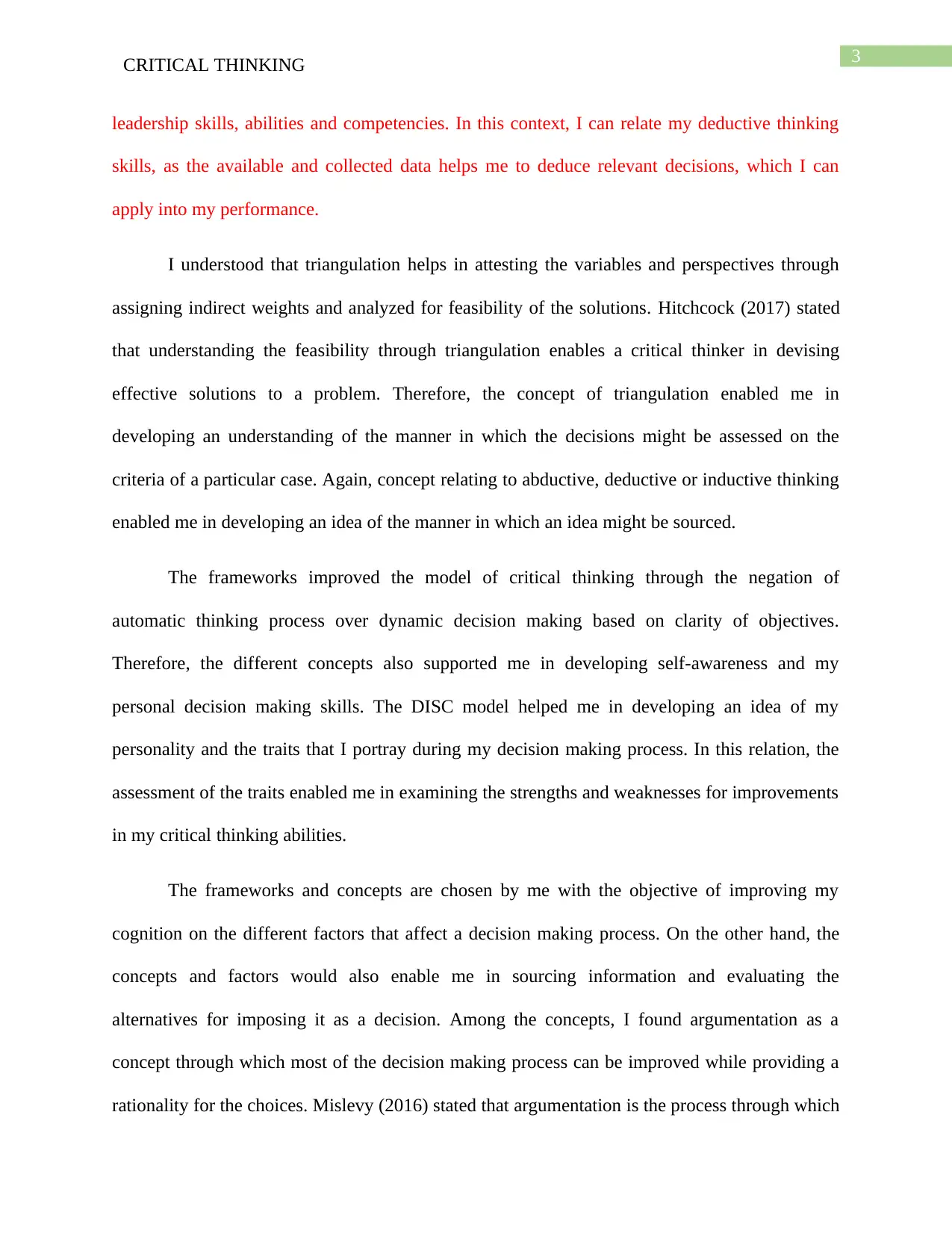
3CRITICAL THINKING
leadership skills, abilities and competencies. In this context, I can relate my deductive thinking
skills, as the available and collected data helps me to deduce relevant decisions, which I can
apply into my performance.
I understood that triangulation helps in attesting the variables and perspectives through
assigning indirect weights and analyzed for feasibility of the solutions. Hitchcock (2017) stated
that understanding the feasibility through triangulation enables a critical thinker in devising
effective solutions to a problem. Therefore, the concept of triangulation enabled me in
developing an understanding of the manner in which the decisions might be assessed on the
criteria of a particular case. Again, concept relating to abductive, deductive or inductive thinking
enabled me in developing an idea of the manner in which an idea might be sourced.
The frameworks improved the model of critical thinking through the negation of
automatic thinking process over dynamic decision making based on clarity of objectives.
Therefore, the different concepts also supported me in developing self-awareness and my
personal decision making skills. The DISC model helped me in developing an idea of my
personality and the traits that I portray during my decision making process. In this relation, the
assessment of the traits enabled me in examining the strengths and weaknesses for improvements
in my critical thinking abilities.
The frameworks and concepts are chosen by me with the objective of improving my
cognition on the different factors that affect a decision making process. On the other hand, the
concepts and factors would also enable me in sourcing information and evaluating the
alternatives for imposing it as a decision. Among the concepts, I found argumentation as a
concept through which most of the decision making process can be improved while providing a
rationality for the choices. Mislevy (2016) stated that argumentation is the process through which
leadership skills, abilities and competencies. In this context, I can relate my deductive thinking
skills, as the available and collected data helps me to deduce relevant decisions, which I can
apply into my performance.
I understood that triangulation helps in attesting the variables and perspectives through
assigning indirect weights and analyzed for feasibility of the solutions. Hitchcock (2017) stated
that understanding the feasibility through triangulation enables a critical thinker in devising
effective solutions to a problem. Therefore, the concept of triangulation enabled me in
developing an understanding of the manner in which the decisions might be assessed on the
criteria of a particular case. Again, concept relating to abductive, deductive or inductive thinking
enabled me in developing an idea of the manner in which an idea might be sourced.
The frameworks improved the model of critical thinking through the negation of
automatic thinking process over dynamic decision making based on clarity of objectives.
Therefore, the different concepts also supported me in developing self-awareness and my
personal decision making skills. The DISC model helped me in developing an idea of my
personality and the traits that I portray during my decision making process. In this relation, the
assessment of the traits enabled me in examining the strengths and weaknesses for improvements
in my critical thinking abilities.
The frameworks and concepts are chosen by me with the objective of improving my
cognition on the different factors that affect a decision making process. On the other hand, the
concepts and factors would also enable me in sourcing information and evaluating the
alternatives for imposing it as a decision. Among the concepts, I found argumentation as a
concept through which most of the decision making process can be improved while providing a
rationality for the choices. Mislevy (2016) stated that argumentation is the process through which
Paraphrase This Document
Need a fresh take? Get an instant paraphrase of this document with our AI Paraphraser
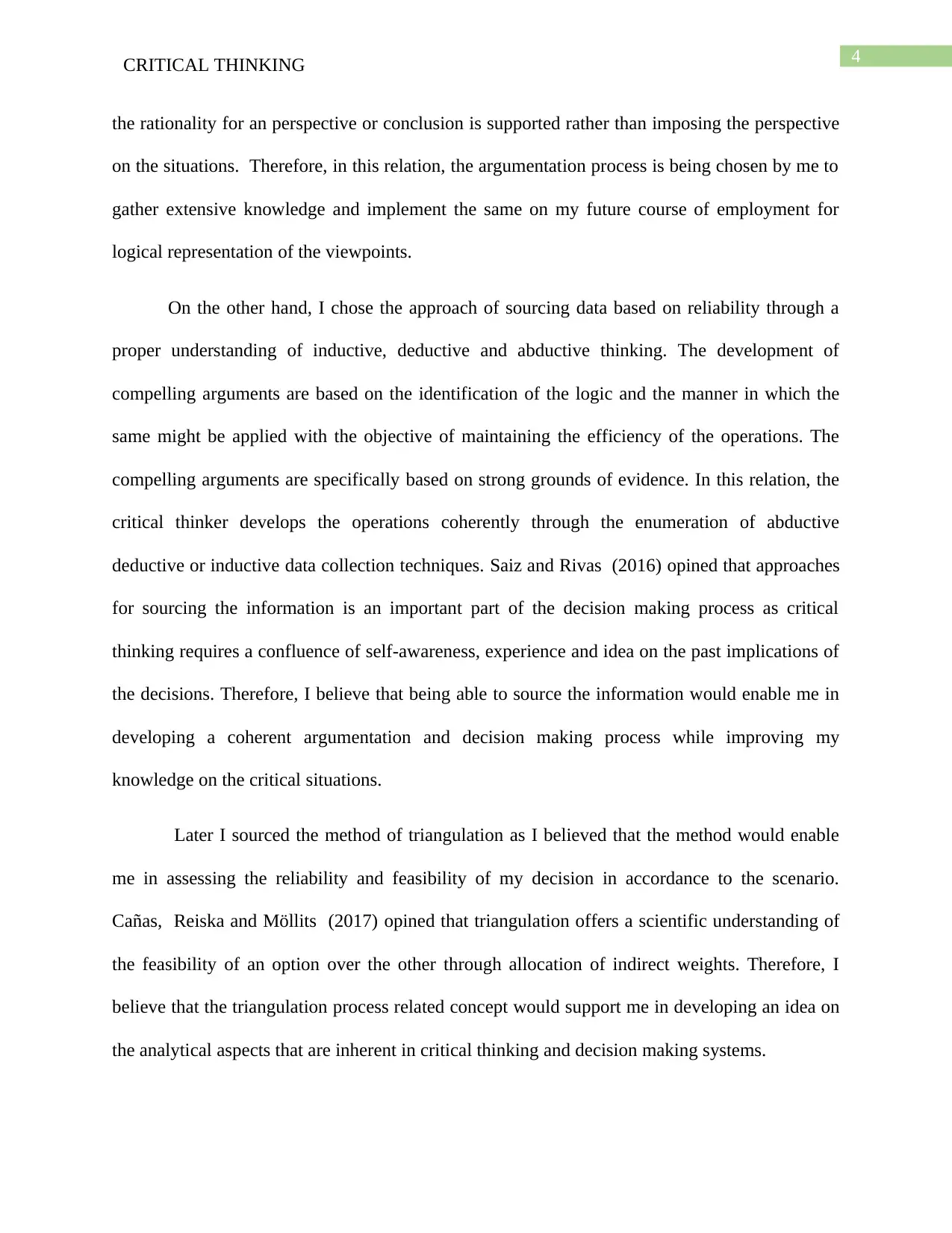
4CRITICAL THINKING
the rationality for an perspective or conclusion is supported rather than imposing the perspective
on the situations. Therefore, in this relation, the argumentation process is being chosen by me to
gather extensive knowledge and implement the same on my future course of employment for
logical representation of the viewpoints.
On the other hand, I chose the approach of sourcing data based on reliability through a
proper understanding of inductive, deductive and abductive thinking. The development of
compelling arguments are based on the identification of the logic and the manner in which the
same might be applied with the objective of maintaining the efficiency of the operations. The
compelling arguments are specifically based on strong grounds of evidence. In this relation, the
critical thinker develops the operations coherently through the enumeration of abductive
deductive or inductive data collection techniques. Saiz and Rivas (2016) opined that approaches
for sourcing the information is an important part of the decision making process as critical
thinking requires a confluence of self-awareness, experience and idea on the past implications of
the decisions. Therefore, I believe that being able to source the information would enable me in
developing a coherent argumentation and decision making process while improving my
knowledge on the critical situations.
Later I sourced the method of triangulation as I believed that the method would enable
me in assessing the reliability and feasibility of my decision in accordance to the scenario.
Cañas, Reiska and Möllits (2017) opined that triangulation offers a scientific understanding of
the feasibility of an option over the other through allocation of indirect weights. Therefore, I
believe that the triangulation process related concept would support me in developing an idea on
the analytical aspects that are inherent in critical thinking and decision making systems.
the rationality for an perspective or conclusion is supported rather than imposing the perspective
on the situations. Therefore, in this relation, the argumentation process is being chosen by me to
gather extensive knowledge and implement the same on my future course of employment for
logical representation of the viewpoints.
On the other hand, I chose the approach of sourcing data based on reliability through a
proper understanding of inductive, deductive and abductive thinking. The development of
compelling arguments are based on the identification of the logic and the manner in which the
same might be applied with the objective of maintaining the efficiency of the operations. The
compelling arguments are specifically based on strong grounds of evidence. In this relation, the
critical thinker develops the operations coherently through the enumeration of abductive
deductive or inductive data collection techniques. Saiz and Rivas (2016) opined that approaches
for sourcing the information is an important part of the decision making process as critical
thinking requires a confluence of self-awareness, experience and idea on the past implications of
the decisions. Therefore, I believe that being able to source the information would enable me in
developing a coherent argumentation and decision making process while improving my
knowledge on the critical situations.
Later I sourced the method of triangulation as I believed that the method would enable
me in assessing the reliability and feasibility of my decision in accordance to the scenario.
Cañas, Reiska and Möllits (2017) opined that triangulation offers a scientific understanding of
the feasibility of an option over the other through allocation of indirect weights. Therefore, I
believe that the triangulation process related concept would support me in developing an idea on
the analytical aspects that are inherent in critical thinking and decision making systems.
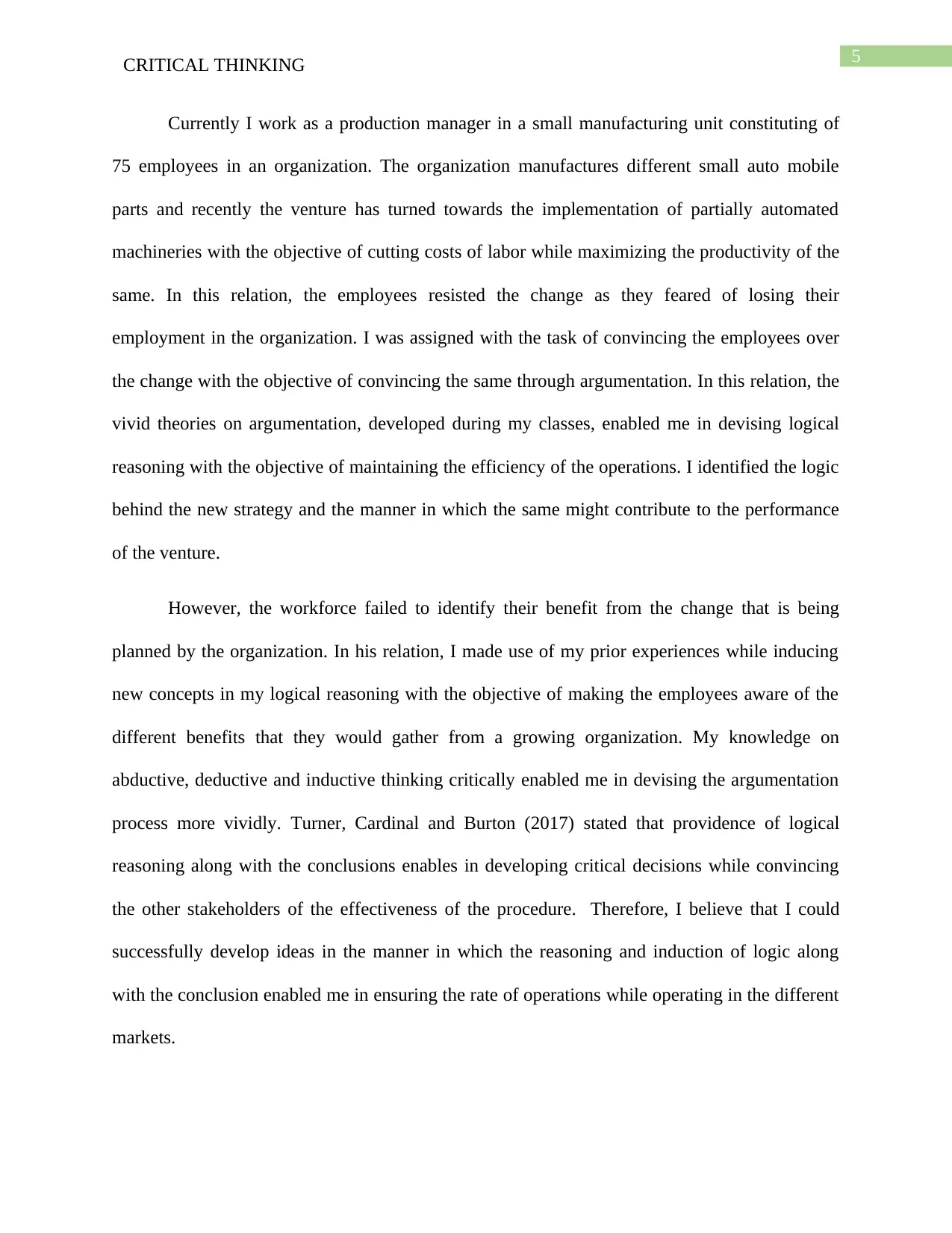
5CRITICAL THINKING
Currently I work as a production manager in a small manufacturing unit constituting of
75 employees in an organization. The organization manufactures different small auto mobile
parts and recently the venture has turned towards the implementation of partially automated
machineries with the objective of cutting costs of labor while maximizing the productivity of the
same. In this relation, the employees resisted the change as they feared of losing their
employment in the organization. I was assigned with the task of convincing the employees over
the change with the objective of convincing the same through argumentation. In this relation, the
vivid theories on argumentation, developed during my classes, enabled me in devising logical
reasoning with the objective of maintaining the efficiency of the operations. I identified the logic
behind the new strategy and the manner in which the same might contribute to the performance
of the venture.
However, the workforce failed to identify their benefit from the change that is being
planned by the organization. In his relation, I made use of my prior experiences while inducing
new concepts in my logical reasoning with the objective of making the employees aware of the
different benefits that they would gather from a growing organization. My knowledge on
abductive, deductive and inductive thinking critically enabled me in devising the argumentation
process more vividly. Turner, Cardinal and Burton (2017) stated that providence of logical
reasoning along with the conclusions enables in developing critical decisions while convincing
the other stakeholders of the effectiveness of the procedure. Therefore, I believe that I could
successfully develop ideas in the manner in which the reasoning and induction of logic along
with the conclusion enabled me in ensuring the rate of operations while operating in the different
markets.
Currently I work as a production manager in a small manufacturing unit constituting of
75 employees in an organization. The organization manufactures different small auto mobile
parts and recently the venture has turned towards the implementation of partially automated
machineries with the objective of cutting costs of labor while maximizing the productivity of the
same. In this relation, the employees resisted the change as they feared of losing their
employment in the organization. I was assigned with the task of convincing the employees over
the change with the objective of convincing the same through argumentation. In this relation, the
vivid theories on argumentation, developed during my classes, enabled me in devising logical
reasoning with the objective of maintaining the efficiency of the operations. I identified the logic
behind the new strategy and the manner in which the same might contribute to the performance
of the venture.
However, the workforce failed to identify their benefit from the change that is being
planned by the organization. In his relation, I made use of my prior experiences while inducing
new concepts in my logical reasoning with the objective of making the employees aware of the
different benefits that they would gather from a growing organization. My knowledge on
abductive, deductive and inductive thinking critically enabled me in devising the argumentation
process more vividly. Turner, Cardinal and Burton (2017) stated that providence of logical
reasoning along with the conclusions enables in developing critical decisions while convincing
the other stakeholders of the effectiveness of the procedure. Therefore, I believe that I could
successfully develop ideas in the manner in which the reasoning and induction of logic along
with the conclusion enabled me in ensuring the rate of operations while operating in the different
markets.
⊘ This is a preview!⊘
Do you want full access?
Subscribe today to unlock all pages.

Trusted by 1+ million students worldwide
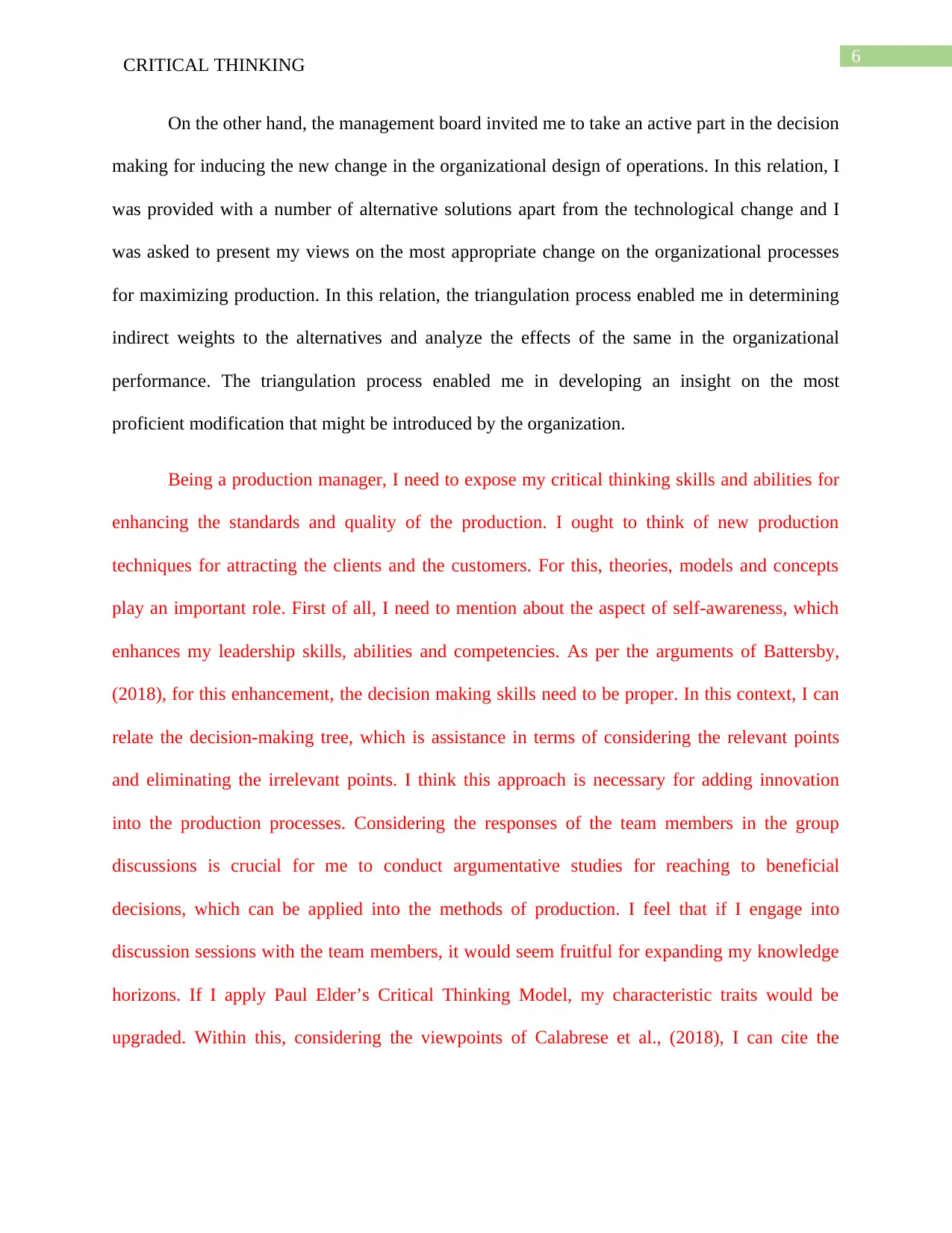
6CRITICAL THINKING
On the other hand, the management board invited me to take an active part in the decision
making for inducing the new change in the organizational design of operations. In this relation, I
was provided with a number of alternative solutions apart from the technological change and I
was asked to present my views on the most appropriate change on the organizational processes
for maximizing production. In this relation, the triangulation process enabled me in determining
indirect weights to the alternatives and analyze the effects of the same in the organizational
performance. The triangulation process enabled me in developing an insight on the most
proficient modification that might be introduced by the organization.
Being a production manager, I need to expose my critical thinking skills and abilities for
enhancing the standards and quality of the production. I ought to think of new production
techniques for attracting the clients and the customers. For this, theories, models and concepts
play an important role. First of all, I need to mention about the aspect of self-awareness, which
enhances my leadership skills, abilities and competencies. As per the arguments of Battersby,
(2018), for this enhancement, the decision making skills need to be proper. In this context, I can
relate the decision-making tree, which is assistance in terms of considering the relevant points
and eliminating the irrelevant points. I think this approach is necessary for adding innovation
into the production processes. Considering the responses of the team members in the group
discussions is crucial for me to conduct argumentative studies for reaching to beneficial
decisions, which can be applied into the methods of production. I feel that if I engage into
discussion sessions with the team members, it would seem fruitful for expanding my knowledge
horizons. If I apply Paul Elder’s Critical Thinking Model, my characteristic traits would be
upgraded. Within this, considering the viewpoints of Calabrese et al., (2018), I can cite the
On the other hand, the management board invited me to take an active part in the decision
making for inducing the new change in the organizational design of operations. In this relation, I
was provided with a number of alternative solutions apart from the technological change and I
was asked to present my views on the most appropriate change on the organizational processes
for maximizing production. In this relation, the triangulation process enabled me in determining
indirect weights to the alternatives and analyze the effects of the same in the organizational
performance. The triangulation process enabled me in developing an insight on the most
proficient modification that might be introduced by the organization.
Being a production manager, I need to expose my critical thinking skills and abilities for
enhancing the standards and quality of the production. I ought to think of new production
techniques for attracting the clients and the customers. For this, theories, models and concepts
play an important role. First of all, I need to mention about the aspect of self-awareness, which
enhances my leadership skills, abilities and competencies. As per the arguments of Battersby,
(2018), for this enhancement, the decision making skills need to be proper. In this context, I can
relate the decision-making tree, which is assistance in terms of considering the relevant points
and eliminating the irrelevant points. I think this approach is necessary for adding innovation
into the production processes. Considering the responses of the team members in the group
discussions is crucial for me to conduct argumentative studies for reaching to beneficial
decisions, which can be applied into the methods of production. I feel that if I engage into
discussion sessions with the team members, it would seem fruitful for expanding my knowledge
horizons. If I apply Paul Elder’s Critical Thinking Model, my characteristic traits would be
upgraded. Within this, considering the viewpoints of Calabrese et al., (2018), I can cite the
Paraphrase This Document
Need a fresh take? Get an instant paraphrase of this document with our AI Paraphraser
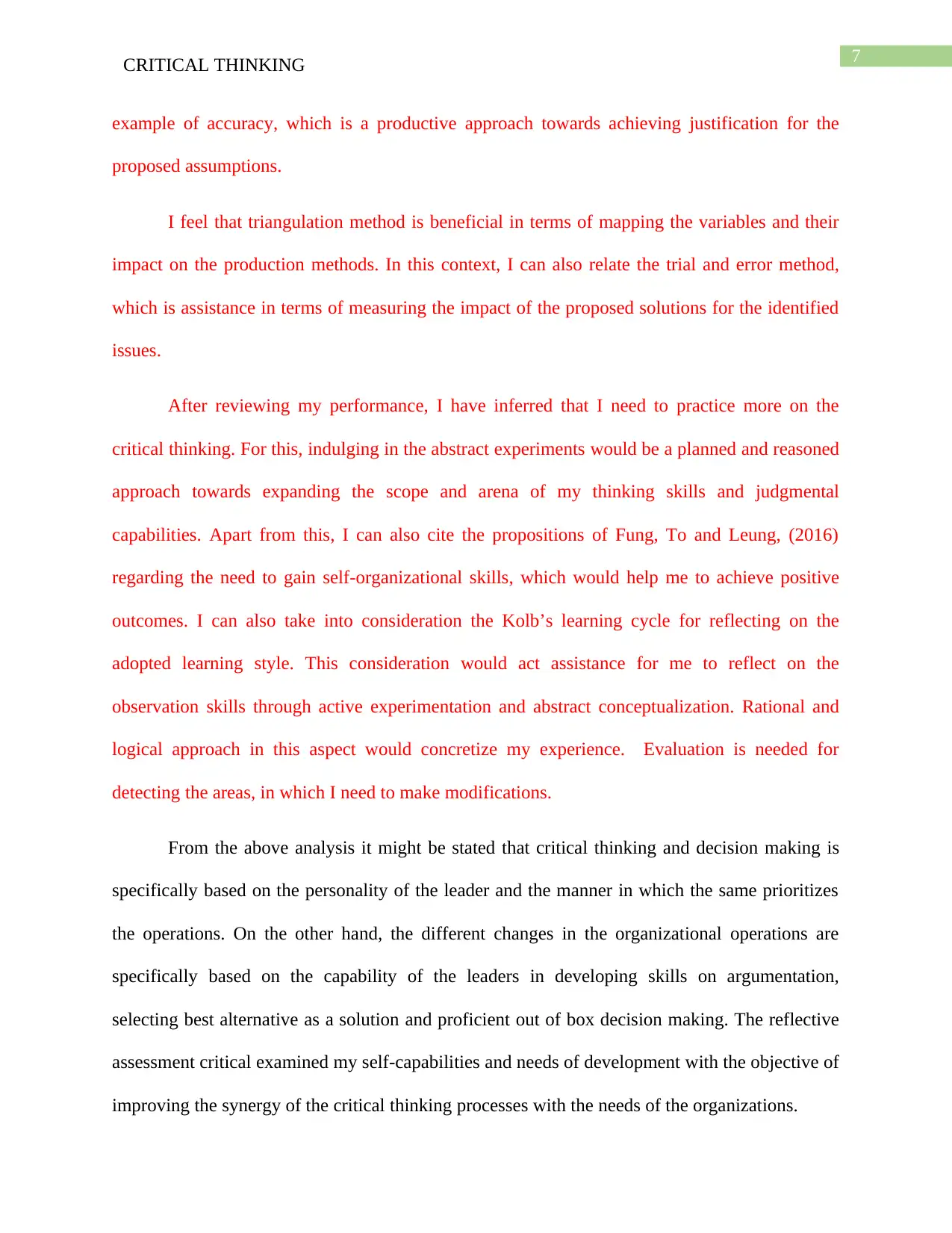
7CRITICAL THINKING
example of accuracy, which is a productive approach towards achieving justification for the
proposed assumptions.
I feel that triangulation method is beneficial in terms of mapping the variables and their
impact on the production methods. In this context, I can also relate the trial and error method,
which is assistance in terms of measuring the impact of the proposed solutions for the identified
issues.
After reviewing my performance, I have inferred that I need to practice more on the
critical thinking. For this, indulging in the abstract experiments would be a planned and reasoned
approach towards expanding the scope and arena of my thinking skills and judgmental
capabilities. Apart from this, I can also cite the propositions of Fung, To and Leung, (2016)
regarding the need to gain self-organizational skills, which would help me to achieve positive
outcomes. I can also take into consideration the Kolb’s learning cycle for reflecting on the
adopted learning style. This consideration would act assistance for me to reflect on the
observation skills through active experimentation and abstract conceptualization. Rational and
logical approach in this aspect would concretize my experience. Evaluation is needed for
detecting the areas, in which I need to make modifications.
From the above analysis it might be stated that critical thinking and decision making is
specifically based on the personality of the leader and the manner in which the same prioritizes
the operations. On the other hand, the different changes in the organizational operations are
specifically based on the capability of the leaders in developing skills on argumentation,
selecting best alternative as a solution and proficient out of box decision making. The reflective
assessment critical examined my self-capabilities and needs of development with the objective of
improving the synergy of the critical thinking processes with the needs of the organizations.
example of accuracy, which is a productive approach towards achieving justification for the
proposed assumptions.
I feel that triangulation method is beneficial in terms of mapping the variables and their
impact on the production methods. In this context, I can also relate the trial and error method,
which is assistance in terms of measuring the impact of the proposed solutions for the identified
issues.
After reviewing my performance, I have inferred that I need to practice more on the
critical thinking. For this, indulging in the abstract experiments would be a planned and reasoned
approach towards expanding the scope and arena of my thinking skills and judgmental
capabilities. Apart from this, I can also cite the propositions of Fung, To and Leung, (2016)
regarding the need to gain self-organizational skills, which would help me to achieve positive
outcomes. I can also take into consideration the Kolb’s learning cycle for reflecting on the
adopted learning style. This consideration would act assistance for me to reflect on the
observation skills through active experimentation and abstract conceptualization. Rational and
logical approach in this aspect would concretize my experience. Evaluation is needed for
detecting the areas, in which I need to make modifications.
From the above analysis it might be stated that critical thinking and decision making is
specifically based on the personality of the leader and the manner in which the same prioritizes
the operations. On the other hand, the different changes in the organizational operations are
specifically based on the capability of the leaders in developing skills on argumentation,
selecting best alternative as a solution and proficient out of box decision making. The reflective
assessment critical examined my self-capabilities and needs of development with the objective of
improving the synergy of the critical thinking processes with the needs of the organizations.
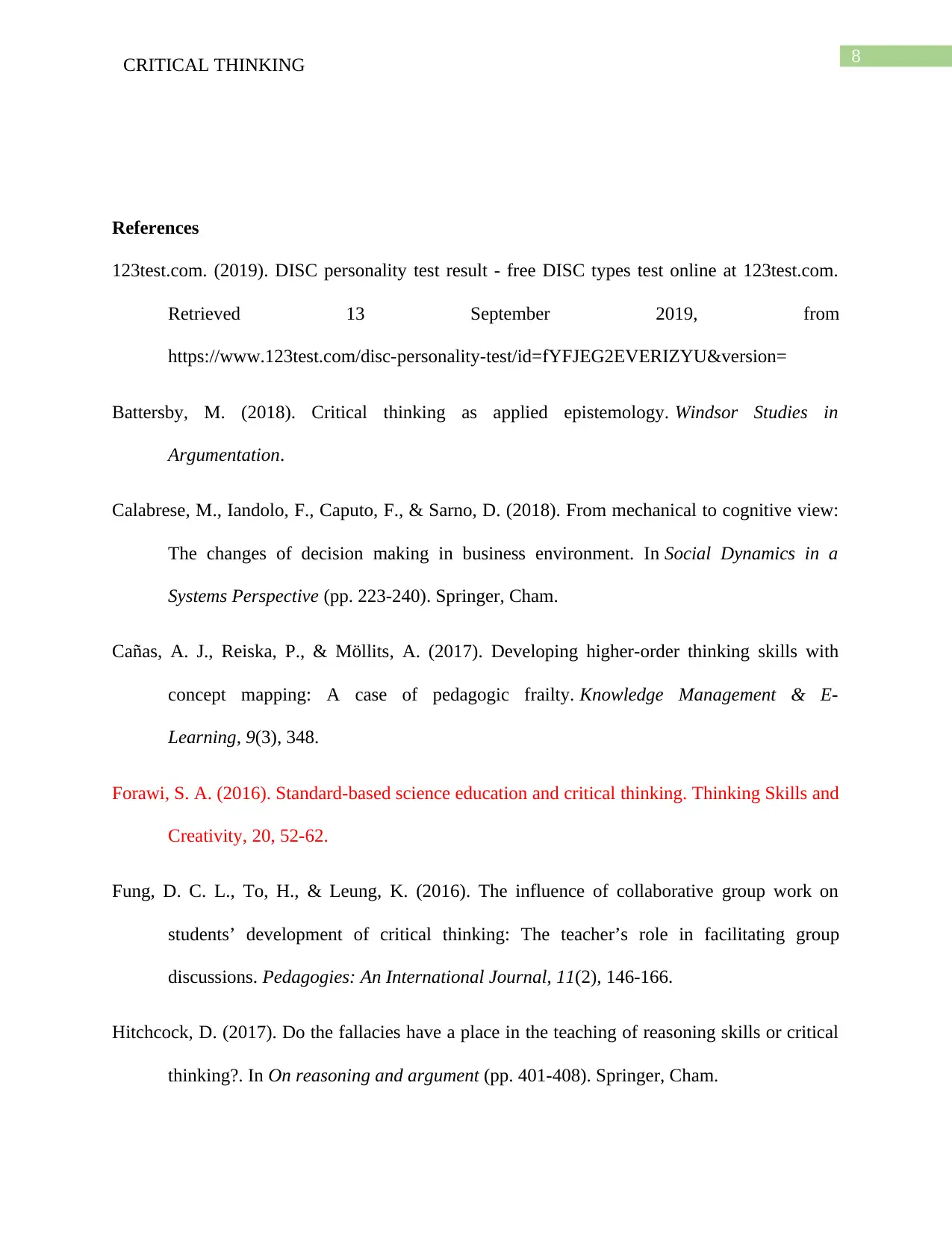
8CRITICAL THINKING
References
123test.com. (2019). DISC personality test result - free DISC types test online at 123test.com.
Retrieved 13 September 2019, from
https://www.123test.com/disc-personality-test/id=fYFJEG2EVERIZYU&version=
Battersby, M. (2018). Critical thinking as applied epistemology. Windsor Studies in
Argumentation.
Calabrese, M., Iandolo, F., Caputo, F., & Sarno, D. (2018). From mechanical to cognitive view:
The changes of decision making in business environment. In Social Dynamics in a
Systems Perspective (pp. 223-240). Springer, Cham.
Cañas, A. J., Reiska, P., & Möllits, A. (2017). Developing higher-order thinking skills with
concept mapping: A case of pedagogic frailty. Knowledge Management & E-
Learning, 9(3), 348.
Forawi, S. A. (2016). Standard-based science education and critical thinking. Thinking Skills and
Creativity, 20, 52-62.
Fung, D. C. L., To, H., & Leung, K. (2016). The influence of collaborative group work on
students’ development of critical thinking: The teacher’s role in facilitating group
discussions. Pedagogies: An International Journal, 11(2), 146-166.
Hitchcock, D. (2017). Do the fallacies have a place in the teaching of reasoning skills or critical
thinking?. In On reasoning and argument (pp. 401-408). Springer, Cham.
References
123test.com. (2019). DISC personality test result - free DISC types test online at 123test.com.
Retrieved 13 September 2019, from
https://www.123test.com/disc-personality-test/id=fYFJEG2EVERIZYU&version=
Battersby, M. (2018). Critical thinking as applied epistemology. Windsor Studies in
Argumentation.
Calabrese, M., Iandolo, F., Caputo, F., & Sarno, D. (2018). From mechanical to cognitive view:
The changes of decision making in business environment. In Social Dynamics in a
Systems Perspective (pp. 223-240). Springer, Cham.
Cañas, A. J., Reiska, P., & Möllits, A. (2017). Developing higher-order thinking skills with
concept mapping: A case of pedagogic frailty. Knowledge Management & E-
Learning, 9(3), 348.
Forawi, S. A. (2016). Standard-based science education and critical thinking. Thinking Skills and
Creativity, 20, 52-62.
Fung, D. C. L., To, H., & Leung, K. (2016). The influence of collaborative group work on
students’ development of critical thinking: The teacher’s role in facilitating group
discussions. Pedagogies: An International Journal, 11(2), 146-166.
Hitchcock, D. (2017). Do the fallacies have a place in the teaching of reasoning skills or critical
thinking?. In On reasoning and argument (pp. 401-408). Springer, Cham.
⊘ This is a preview!⊘
Do you want full access?
Subscribe today to unlock all pages.

Trusted by 1+ million students worldwide
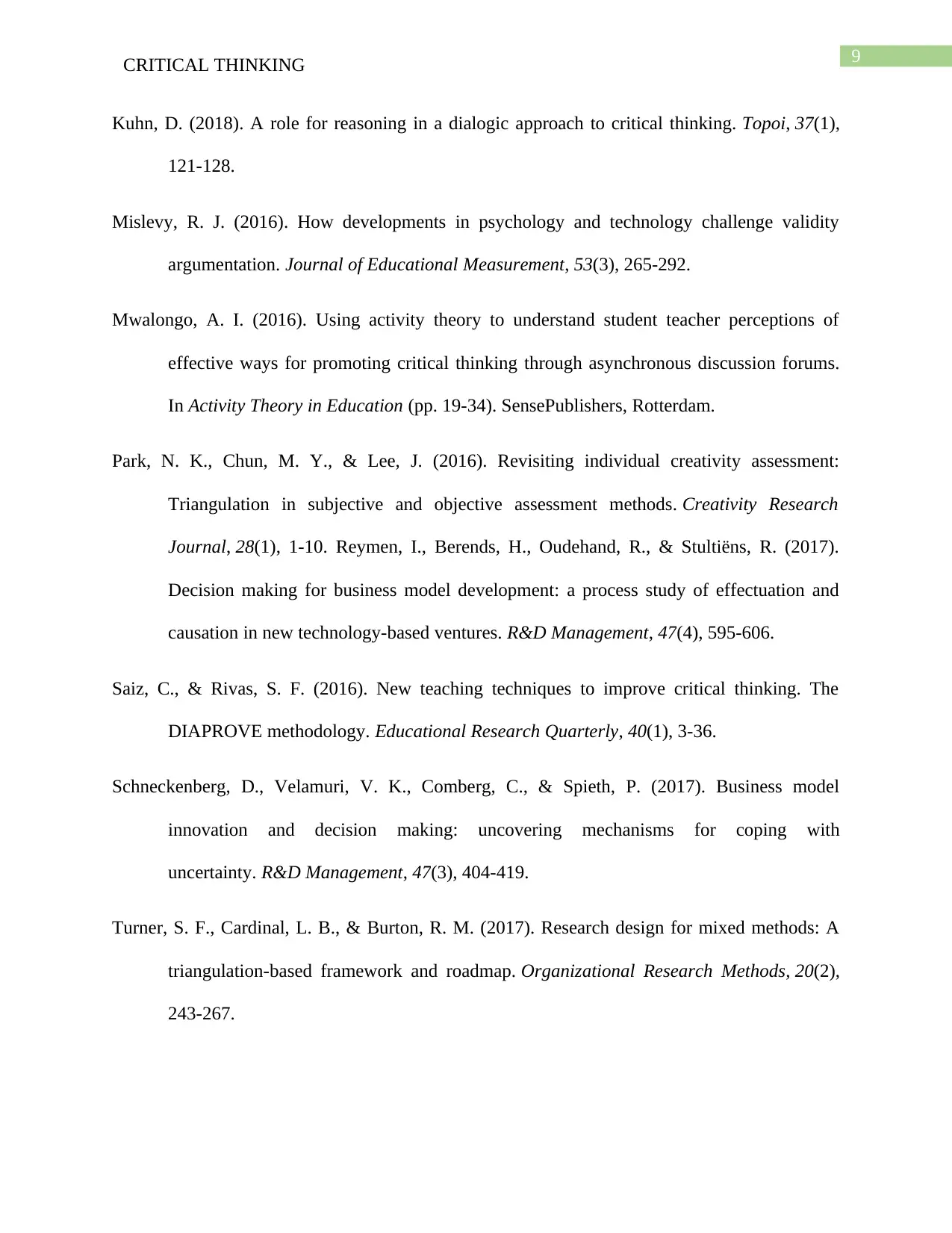
9CRITICAL THINKING
Kuhn, D. (2018). A role for reasoning in a dialogic approach to critical thinking. Topoi, 37(1),
121-128.
Mislevy, R. J. (2016). How developments in psychology and technology challenge validity
argumentation. Journal of Educational Measurement, 53(3), 265-292.
Mwalongo, A. I. (2016). Using activity theory to understand student teacher perceptions of
effective ways for promoting critical thinking through asynchronous discussion forums.
In Activity Theory in Education (pp. 19-34). SensePublishers, Rotterdam.
Park, N. K., Chun, M. Y., & Lee, J. (2016). Revisiting individual creativity assessment:
Triangulation in subjective and objective assessment methods. Creativity Research
Journal, 28(1), 1-10. Reymen, I., Berends, H., Oudehand, R., & Stultiëns, R. (2017).
Decision making for business model development: a process study of effectuation and
causation in new technology‐based ventures. R&D Management, 47(4), 595-606.
Saiz, C., & Rivas, S. F. (2016). New teaching techniques to improve critical thinking. The
DIAPROVE methodology. Educational Research Quarterly, 40(1), 3-36.
Schneckenberg, D., Velamuri, V. K., Comberg, C., & Spieth, P. (2017). Business model
innovation and decision making: uncovering mechanisms for coping with
uncertainty. R&D Management, 47(3), 404-419.
Turner, S. F., Cardinal, L. B., & Burton, R. M. (2017). Research design for mixed methods: A
triangulation-based framework and roadmap. Organizational Research Methods, 20(2),
243-267.
Kuhn, D. (2018). A role for reasoning in a dialogic approach to critical thinking. Topoi, 37(1),
121-128.
Mislevy, R. J. (2016). How developments in psychology and technology challenge validity
argumentation. Journal of Educational Measurement, 53(3), 265-292.
Mwalongo, A. I. (2016). Using activity theory to understand student teacher perceptions of
effective ways for promoting critical thinking through asynchronous discussion forums.
In Activity Theory in Education (pp. 19-34). SensePublishers, Rotterdam.
Park, N. K., Chun, M. Y., & Lee, J. (2016). Revisiting individual creativity assessment:
Triangulation in subjective and objective assessment methods. Creativity Research
Journal, 28(1), 1-10. Reymen, I., Berends, H., Oudehand, R., & Stultiëns, R. (2017).
Decision making for business model development: a process study of effectuation and
causation in new technology‐based ventures. R&D Management, 47(4), 595-606.
Saiz, C., & Rivas, S. F. (2016). New teaching techniques to improve critical thinking. The
DIAPROVE methodology. Educational Research Quarterly, 40(1), 3-36.
Schneckenberg, D., Velamuri, V. K., Comberg, C., & Spieth, P. (2017). Business model
innovation and decision making: uncovering mechanisms for coping with
uncertainty. R&D Management, 47(3), 404-419.
Turner, S. F., Cardinal, L. B., & Burton, R. M. (2017). Research design for mixed methods: A
triangulation-based framework and roadmap. Organizational Research Methods, 20(2),
243-267.
Paraphrase This Document
Need a fresh take? Get an instant paraphrase of this document with our AI Paraphraser
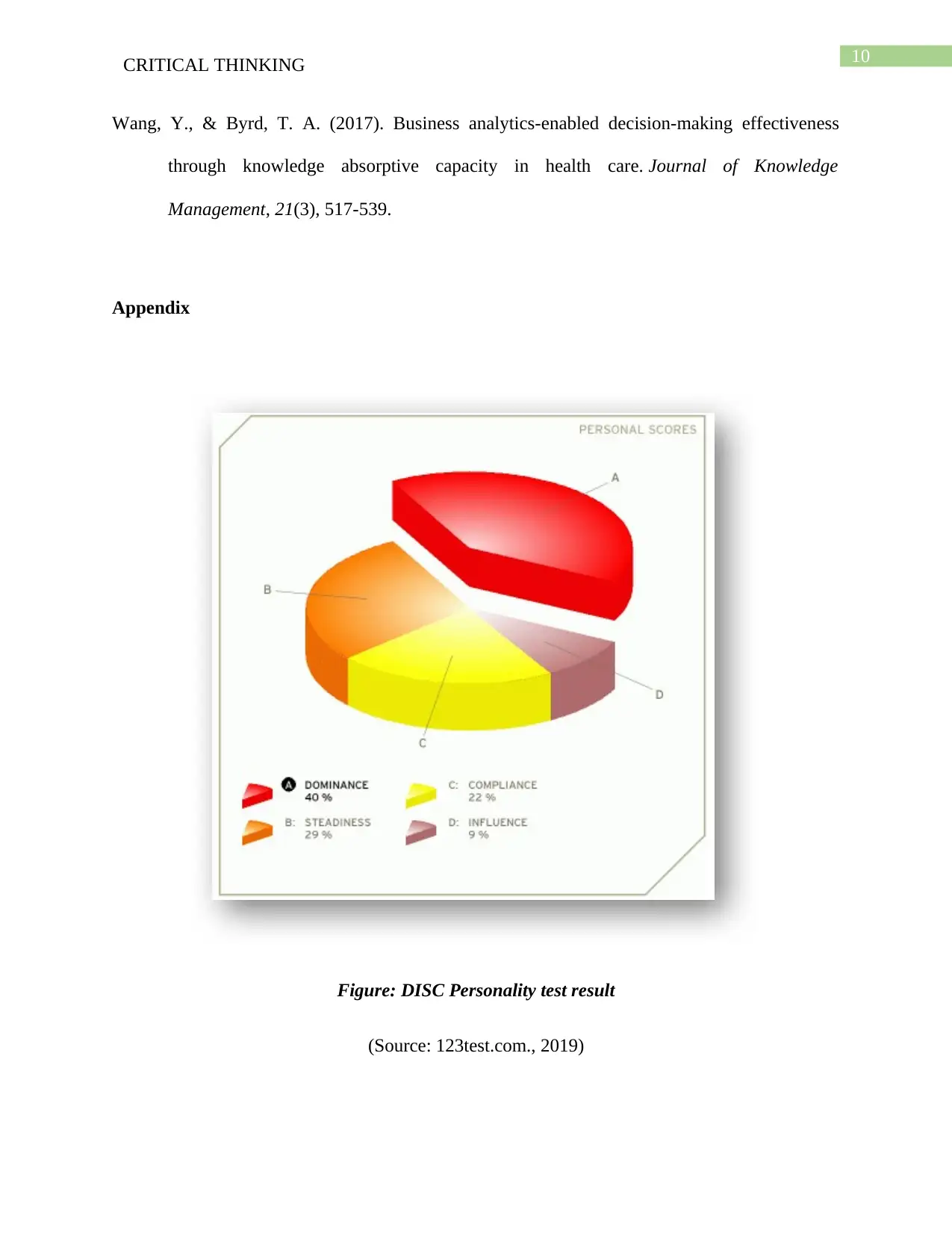
10CRITICAL THINKING
Wang, Y., & Byrd, T. A. (2017). Business analytics-enabled decision-making effectiveness
through knowledge absorptive capacity in health care. Journal of Knowledge
Management, 21(3), 517-539.
Appendix
Figure: DISC Personality test result
(Source: 123test.com., 2019)
Wang, Y., & Byrd, T. A. (2017). Business analytics-enabled decision-making effectiveness
through knowledge absorptive capacity in health care. Journal of Knowledge
Management, 21(3), 517-539.
Appendix
Figure: DISC Personality test result
(Source: 123test.com., 2019)

11CRITICAL THINKING
⊘ This is a preview!⊘
Do you want full access?
Subscribe today to unlock all pages.

Trusted by 1+ million students worldwide
1 out of 12
Your All-in-One AI-Powered Toolkit for Academic Success.
+13062052269
info@desklib.com
Available 24*7 on WhatsApp / Email
![[object Object]](/_next/static/media/star-bottom.7253800d.svg)
Unlock your academic potential
Copyright © 2020–2026 A2Z Services. All Rights Reserved. Developed and managed by ZUCOL.
